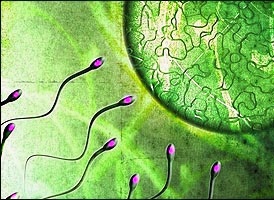 3rd August 2009 Tokyo Japan : Men may carry the reason for their limited lifespan in their sperm, a study has suggested.
3rd August 2009 Tokyo Japan : Men may carry the reason for their limited lifespan in their sperm, a study has suggested.
Scientists believe a particular male gene may explain why men do not live as long as women.
The gene is passed on to offspring by sperm but is only active in men, allowing them to grow bigger bodies at the expense of longevity, according to the theory.
Although the study was conducted on mice, scientists think the findings could apply to all mammals including humans.
The Japanese researchers looked at mice created with genetic material from two mothers but no father. The 13 “bi-maternal” (BM) mice were produced by manipulating DNA so that the genes in young mouse eggs behaved like those in sperm, giving them the ability to fertilise. The altered genetic material was then implanted into eggs of adult female mice to create embryos. Resulting offspring had genes inherited from two mothers, with no contribution made by sperm.
BM mice were found to live on average a third longer than normal. Normal mice created through natural mating lived no longer than 996 days, while the longest surviving BM mouse lived 1,045 days. The mice with two mothers were significantly lighter and smaller at birth, and also appeared to have better functioning immune systems.
The gene believed to be responsible is “imprinted” – the name given to the process by which genes inherited from parents are switched on or off in male or female offspring. In this case, the gene is silenced in females when inherited from the father.
Study leader Professor Tomohiro Kono, director of the Nodai Research Institute in Tokyo, said: “We believe that the most likely reason for the differences in longevity relates to the repression of a gene called Rasgrf1 in the BM mice. This gene normally expresses from the paternally inherited chromosome and is an imprinted gene on chromosome 9 associated with post-natal growth.”
Writing in the journal Human Reproduction, the scientists said the results were consistent with theories on sex-specific reproductive strategies. Male individuals concentrated resources into a larger body size in order to achieve more breeding opportunities, even though this resulted in shorter longevity, said the researchers. Females, in contrast, tended to “optimise their reproductive output by conserving energy for delivery, providing for offspring, foraging and predator avoidance”.
The scientists added: “Our results … suggested sex differences in longevity originating at the genome level, implying that the sperm genome has a detrimental effect on longevity in mammals.”
